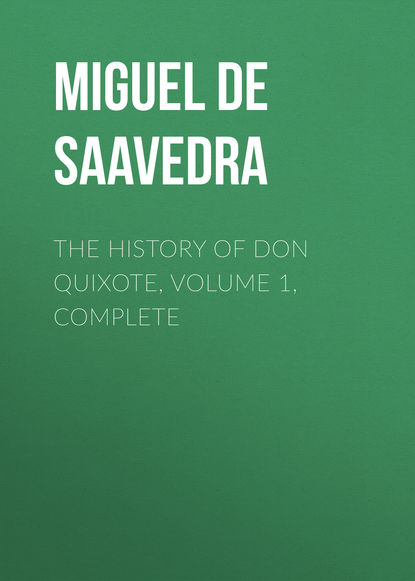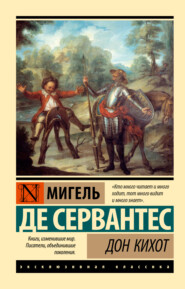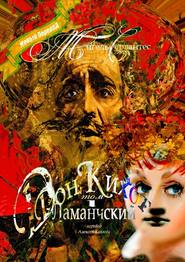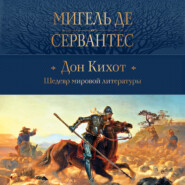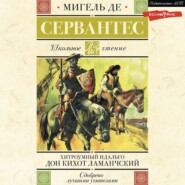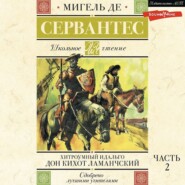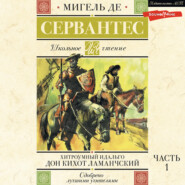По всем вопросам обращайтесь на: info@litportal.ru
(©) 2003-2025.
✖
The History of Don Quixote, Volume 1, Complete
Настройки чтения
Размер шрифта
Высота строк
Поля
“What vial and what balsam is that?” said Sancho Panza.
“It is a balsam,” answered Don Quixote, “the receipt of which I have in my memory, with which one need have no fear of death, or dread dying of any wound; and so when I make it and give it to thee thou hast nothing to do when in some battle thou seest they have cut me in half through the middle of the body – as is wont to happen frequently – but neatly and with great nicety, ere the blood congeal, to place that portion of the body which shall have fallen to the ground upon the other half which remains in the saddle, taking care to fit it on evenly and exactly. Then thou shalt give me to drink but two drops of the balsam I have mentioned, and thou shalt see me become sounder than an apple.”
“If that be so,” said Panza, “I renounce henceforth the government of the promised island, and desire nothing more in payment of my many and faithful services than that your worship give me the receipt of this supreme liquor, for I am persuaded it will be worth more than two reals an ounce anywhere, and I want no more to pass the rest of my life in ease and honour; but it remains to be told if it costs much to make it.”
“With less than three reals, six quarts of it may be made,” said Don Quixote.
“Sinner that I am!” said Sancho, “then why does your worship put off making it and teaching it to me?”
“Peace, friend,” answered Don Quixote; “greater secrets I mean to teach thee and greater favours to bestow upon thee; and for the present let us see to the dressing, for my ear pains me more than I could wish.”
Sancho took out some lint and ointment from the alforjas; but when Don Quixote came to see his helmet shattered, he was like to lose his senses, and clapping his hand upon his sword and raising his eyes to heaven, he said, “I swear by the Creator of all things and the four Gospels in their fullest extent, to do as the great Marquis of Mantua did when he swore to avenge the death of his nephew Baldwin (and that was not to eat bread from a table-cloth, nor embrace his wife, and other points which, though I cannot now call them to mind, I here grant as expressed) until I take complete vengeance upon him who has committed such an offence against me.”
Hearing this, Sancho said to him, “Your worship should bear in mind, Senor Don Quixote, that if the knight has done what was commanded him in going to present himself before my lady Dulcinea del Toboso, he will have done all that he was bound to do, and does not deserve further punishment unless he commits some new offence.”
“Thou hast said well and hit the point,” answered Don Quixote; and so I recall the oath in so far as relates to taking fresh vengeance on him, but I make and confirm it anew to lead the life I have said until such time as I take by force from some knight another helmet such as this and as good; and think not, Sancho, that I am raising smoke with straw in doing so, for I have one to imitate in the matter, since the very same thing to a hair happened in the case of Mambrino’s helmet, which cost Sacripante so dear.”
“Senor,” replied Sancho, “let your worship send all such oaths to the devil, for they are very pernicious to salvation and prejudicial to the conscience; just tell me now, if for several days to come we fall in with no man armed with a helmet, what are we to do? Is the oath to be observed in spite of all the inconvenience and discomfort it will be to sleep in your clothes, and not to sleep in a house, and a thousand other mortifications contained in the oath of that old fool the Marquis of Mantua, which your worship is now wanting to revive? Let your worship observe that there are no men in armour travelling on any of these roads, nothing but carriers and carters, who not only do not wear helmets, but perhaps never heard tell of them all their lives.”
“Thou art wrong there,” said Don Quixote, “for we shall not have been above two hours among these cross-roads before we see more men in armour than came to Albraca to win the fair Angelica.”
“Enough,” said Sancho; “so be it then, and God grant us success, and that the time for winning that island which is costing me so dear may soon come, and then let me die.”
“I have already told thee, Sancho,” said Don Quixote, “not to give thyself any uneasiness on that score; for if an island should fail, there is the kingdom of Denmark, or of Sobradisa, which will fit thee as a ring fits the finger, and all the more that, being on terra firma, thou wilt all the better enjoy thyself. But let us leave that to its own time; see if thou hast anything for us to eat in those alforjas, because we must presently go in quest of some castle where we may lodge to-night and make the balsam I told thee of, for I swear to thee by God, this ear is giving me great pain.”
“I have here an onion and a little cheese and a few scraps of bread,” said Sancho, “but they are not victuals fit for a valiant knight like your worship.”
“How little thou knowest about it,” answered Don Quixote; “I would have thee to know, Sancho, that it is the glory of knights-errant to go without eating for a month, and even when they do eat, that it should be of what comes first to hand; and this would have been clear to thee hadst thou read as many histories as I have, for, though they are very many, among them all I have found no mention made of knights-errant eating, unless by accident or at some sumptuous banquets prepared for them, and the rest of the time they passed in dalliance. And though it is plain they could not do without eating and performing all the other natural functions, because, in fact, they were men like ourselves, it is plain too that, wandering as they did the most part of their lives through woods and wilds and without a cook, their most usual fare would be rustic viands such as those thou now offer me; so that, friend Sancho, let not that distress thee which pleases me, and do not seek to make a new world or pervert knight-errantry.”
“Pardon me, your worship,” said Sancho, “for, as I cannot read or write, as I said just now, I neither know nor comprehend the rules of the profession of chivalry: henceforward I will stock the alforjas with every kind of dry fruit for your worship, as you are a knight; and for myself, as I am not one, I will furnish them with poultry and other things more substantial.”
“I do not say, Sancho,” replied Don Quixote, “that it is imperative on knights-errant not to eat anything else but the fruits thou speakest of; only that their more usual diet must be those, and certain herbs they found in the fields which they knew and I know too.”
“A good thing it is,” answered Sancho, “to know those herbs, for to my thinking it will be needful some day to put that knowledge into practice.”
And here taking out what he said he had brought, the pair made their repast peaceably and sociably. But anxious to find quarters for the night, they with all despatch made an end of their poor dry fare, mounted at once, and made haste to reach some habitation before night set in; but daylight and the hope of succeeding in their object failed them close by the huts of some goatherds, so they determined to pass the night there, and it was as much to Sancho’s discontent not to have reached a house, as it was to his master’s satisfaction to sleep under the open heaven, for he fancied that each time this happened to him he performed an act of ownership that helped to prove his chivalry.
CHAPTER XI.
WHAT BEFELL DON QUIXOTE WITH CERTAIN GOATHERDS
He was cordially welcomed by the goatherds, and Sancho, having as best he could put up Rocinante and the ass, drew towards the fragrance that came from some pieces of salted goat simmering in a pot on the fire; and though he would have liked at once to try if they were ready to be transferred from the pot to the stomach, he refrained from doing so as the goatherds removed them from the fire, and laying sheepskins on the ground, quickly spread their rude table, and with signs of hearty good-will invited them both to share what they had. Round the skins six of the men belonging to the fold seated themselves, having first with rough politeness pressed Don Quixote to take a seat upon a trough which they placed for him upside down. Don Quixote seated himself, and Sancho remained standing to serve the cup, which was made of horn. Seeing him standing, his master said to him:
“That thou mayest see, Sancho, the good that knight-errantry contains in itself, and how those who fill any office in it are on the high road to be speedily honoured and esteemed by the world, I desire that thou seat thyself here at my side and in the company of these worthy people, and that thou be one with me who am thy master and natural lord, and that thou eat from my plate and drink from whatever I drink from; for the same may be said of knight-errantry as of love, that it levels all.”
“Great thanks,” said Sancho, “but I may tell your worship that provided I have enough to eat, I can eat it as well, or better, standing, and by myself, than seated alongside of an emperor. And indeed, if the truth is to be told, what I eat in my corner without form or fuss has much more relish for me, even though it be bread and onions, than the turkeys of those other tables where I am forced to chew slowly, drink little, wipe my mouth every minute, and cannot sneeze or cough if I want or do other things that are the privileges of liberty and solitude. So, senor, as for these honours which your worship would put upon me as a servant and follower of knight-errantry, exchange them for other things which may be of more use and advantage to me; for these, though I fully acknowledge them as received, I renounce from this moment to the end of the world.”
“For all that,” said Don Quixote, “thou must seat thyself, because him who humbleth himself God exalteth;” and seizing him by the arm he forced him to sit down beside himself.
The goatherds did not understand this jargon about squires and knights-errant, and all they did was to eat in silence and stare at their guests, who with great elegance and appetite were stowing away pieces as big as one’s fist. The course of meat finished, they spread upon the sheepskins a great heap of parched acorns, and with them they put down a half cheese harder than if it had been made of mortar. All this while the horn was not idle, for it went round so constantly, now full, now empty, like the bucket of a water-wheel, that it soon drained one of the two wine-skins that were in sight. When Don Quixote had quite appeased his appetite he took up a handful of the acorns, and contemplating them attentively delivered himself somewhat in this fashion:
“Happy the age, happy the time, to which the ancients gave the name of golden, not because in that fortunate age the gold so coveted in this our iron one was gained without toil, but because they that lived in it knew not the two words “mine” and “thine”! In that blessed age all things were in common; to win the daily food no labour was required of any save to stretch forth his hand and gather it from the sturdy oaks that stood generously inviting him with their sweet ripe fruit. The clear streams and running brooks yielded their savoury limpid waters in noble abundance. The busy and sagacious bees fixed their republic in the clefts of the rocks and hollows of the trees, offering without usance the plenteous produce of their fragrant toil to every hand. The mighty cork trees, unenforced save of their own courtesy, shed the broad light bark that served at first to roof the houses supported by rude stakes, a protection against the inclemency of heaven alone. Then all was peace, all friendship, all concord; as yet the dull share of the crooked plough had not dared to rend and pierce the tender bowels of our first mother that without compulsion yielded from every portion of her broad fertile bosom all that could satisfy, sustain, and delight the children that then possessed her. Then was it that the innocent and fair young shepherdess roamed from vale to vale and hill to hill, with flowing locks, and no more garments than were needful modestly to cover what modesty seeks and ever sought to hide. Nor were their ornaments like those in use to-day, set off by Tyrian purple, and silk tortured in endless fashions, but the wreathed leaves of the green dock and ivy, wherewith they went as bravely and becomingly decked as our Court dames with all the rare and far-fetched artifices that idle curiosity has taught them. Then the love-thoughts of the heart clothed themselves simply and naturally as the heart conceived them, nor sought to commend themselves by forced and rambling verbiage. Fraud, deceit, or malice had then not yet mingled with truth and sincerity. Justice held her ground, undisturbed and unassailed by the efforts of favour and of interest, that now so much impair, pervert, and beset her. Arbitrary law had not yet established itself in the mind of the judge, for then there was no cause to judge and no one to be judged. Maidens and modesty, as I have said, wandered at will alone and unattended, without fear of insult from lawlessness or libertine assault, and if they were undone it was of their own will and pleasure. But now in this hateful age of ours not one is safe, not though some new labyrinth like that of Crete conceal and surround her; even there the pestilence of gallantry will make its way to them through chinks or on the air by the zeal of its accursed importunity, and, despite of all seclusion, lead them to ruin. In defence of these, as time advanced and wickedness increased, the order of knights-errant was instituted, to defend maidens, to protect widows and to succour the orphans and the needy. To this order I belong, brother goatherds, to whom I return thanks for the hospitality and kindly welcome ye offer me and my squire; for though by natural law all living are bound to show favour to knights-errant, yet, seeing that without knowing this obligation ye have welcomed and feasted me, it is right that with all the good-will in my power I should thank you for yours.”
All this long harangue (which might very well have been spared) our knight delivered because the acorns they gave him reminded him of the golden age; and the whim seized him to address all this unnecessary argument to the goatherds, who listened to him gaping in amazement without saying a word in reply. Sancho likewise held his peace and ate acorns, and paid repeated visits to the second wine-skin, which they had hung up on a cork tree to keep the wine cool.
Don Quixote was longer in talking than the supper in finishing, at the end of which one of the goatherds said, “That your worship, senor knight-errant, may say with more truth that we show you hospitality with ready good-will, we will give you amusement and pleasure by making one of our comrades sing: he will be here before long, and he is a very intelligent youth and deep in love, and what is more he can read and write and play on the rebeck to perfection.”
The goatherd had hardly done speaking, when the notes of the rebeck reached their ears; and shortly after, the player came up, a very good-looking young man of about two-and-twenty. His comrades asked him if he had supped, and on his replying that he had, he who had already made the offer said to him:
“In that case, Antonio, thou mayest as well do us the pleasure of singing a little, that the gentleman, our guest, may see that even in the mountains and woods there are musicians: we have told him of thy accomplishments, and we want thee to show them and prove that we say true; so, as thou livest, pray sit down and sing that ballad about thy love that thy uncle the prebendary made thee, and that was so much liked in the town.”
“With all my heart,” said the young man, and without waiting for more pressing he seated himself on the trunk of a felled oak, and tuning his rebeck, presently began to sing to these words.
ANTONIO’S BALLAD
Thou dost love me well, Olalla;
Well I know it, even though
Love’s mute tongues, thine eyes, have never
By their glances told me so.
For I know my love thou knowest,
Therefore thine to claim I dare:
Once it ceases to be secret,
Love need never feel despair.
True it is, Olalla, sometimes
Thou hast all too plainly shown
That thy heart is brass in hardness,
And thy snowy bosom stone.
Yet for all that, in thy coyness,
And thy fickle fits between,
Hope is there – at least the border
Of her garment may be seen.
Lures to faith are they, those glimpses,
And to faith in thee I hold;
Kindness cannot make it stronger,
Coldness cannot make it cold.
If it be that love is gentle,
In thy gentleness I see
Something holding out assurance
To the hope of winning thee.
If it be that in devotion
Lies a power hearts to move,
That which every day I show thee,





